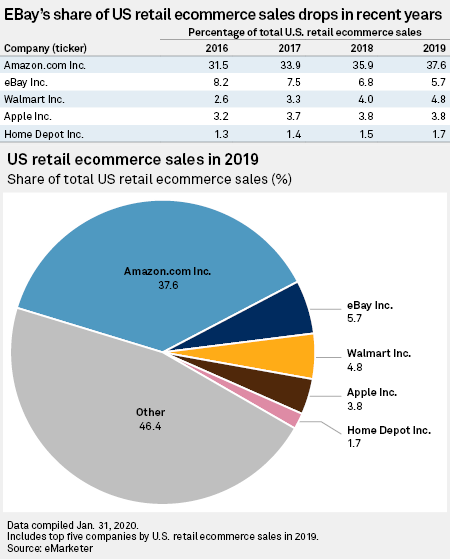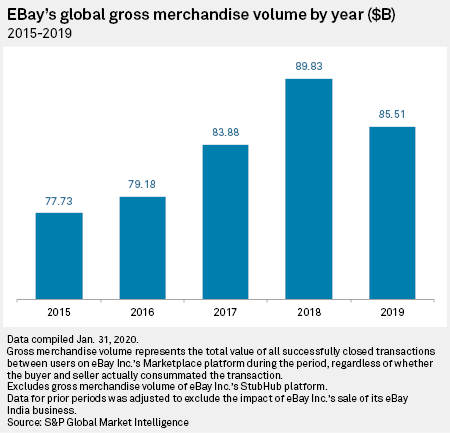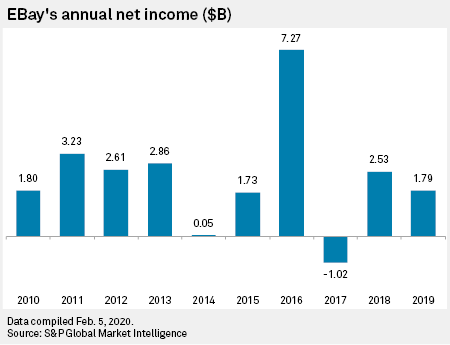A potential takeover of online marketplace pioneer eBay Inc. by the New York Stock Exchange’s owner, Intercontinental Exchange Inc., would be a bold move for an e-commerce player lagging behind its competitors but some analysts are wondering what expertise a stock market operator is actually bringing to the table.
ICE submitted a takeover offer to eBay Inc. in a deal that values the online retailer at more than $30 billion, The Wall Street Journal reported Feb. 4. The stock market operator later confirmed that it approached eBay to explore “potential opportunities” that might create value for the shareholders of both companies but it is not in negotiations for a sale. EBay did not address the WSJ report directly but said via email that its board is focusing on creating shareholder value. The WSJ report sent eBay shares as high as 10% on Feb. 4 but its shares closed down 0.8% on Feb. 5.
Analysts questioned the synergies between a securities marketplace and an e-commerce marketplace, but say a union might be beneficial if the combined company can boost growth for the e-commerce company. EBay is squeezed between rivals large and small and remains under pressure from activist investors Elliott Management Corp. and Starboard Value LP that have demanded the online retailer to cut costs and shed assets.
EBay did not immediately respond to inquiries for this story. ICE declined to comment. The stock market operator is slated to report fourth quarter earnings Feb. 6.
Potential value
While experts say they would need to learn more about a potential deal to understand the logic of such an acquisition, ICE’s interest in eBay speaks to the potential value of the company, which had 183 million active buyers as of the fourth quarter ending Dec. 31, 2019, up from 179 million buyers during the fourth quarter of 2018.
A potential takeover indicates that the exchange “appreciates the marketplace nature of the business as well as the financial model and is looking at eBay more from a financial standpoint and less of a strategic standpoint,” said Tom Forte, managing director with D.A. Davidson in New York, in an interview. “I would say this would be a favorable outcome for eBay’s shareholders.”
Still, some experts wondered why ICE would be interested in eBay. R.J. Hottovy, a Morningstar analyst who covers eBay, said in a Feb. 4 email message that it’s not surprising that the company was approached about selling the business but “it’s hard to see synergies with ICE.”
“Some of the other exchanges have had success streamlining data for non-capital market transactions, but I’m not sure how ICE would be able to help eBay reaccelerate buyer/seller growth,” Hottovy stated.
Others saw potential. Daniel Ives, a tech analyst with Wedbush Securities, said in an interview that a union between ICE and eBay could help the retailer further cut costs and sell off assets. ICE describes itself as a Fortune 500 company formed in 2000 that operates exchanges, clearinghouses and information services and has a “track record of creating shareholder value” through organic growth and acquisitions.
“Any time you get new blood and new leadership, it could potentially change the story,” Ives said. “Any company that is acquiring is doing it for synergies and cost-cutting. But right now there are more questions than answers.”
EBay has already made progress on disposing parts of its business, with plans to sell its online ticketing unit, StubHub, to Swiss ticket vendor Viagogo for $4.05 billion in cash. That deal is expected to close by the end of the first quarter. EBay’s Classified business could be next as Starboard on Feb. 4 renewed pressure on the company to sell or spin off Classified, saying it “must be separated, and a more comprehensive and aggressive operating plan must be put in place to drive profitable growth in the core Marketplace business.”
Competition from large and niche players
A potential takeover holds significant for a company that has struggled to keep pace with competitors large and small.
EBay is a distant second-place finisher in the U.S. e-commerce market. Its market share slid to 5.7% in 2019, down from 8.2% in 2016, according to eMarketer. Amazon.com Inc. dominated the space with a 37.6% share of U.S. e-commerce sales in 2019. Meanwhile, big-box player Walmart Inc. held a 4.8% share in 2019, followed by Apple Inc. with a 3.8% share and Home Depot Inc. with a 1.7% share.
Smaller niche players like Brooklyn, N.Y.-based Etsy Inc. have created competition for the custom, unique items that eBay built its brand on, while Facebook Inc.’s Marketplace platform allows consumers to offload everything from furniture to apparel, often for free.
 |
EBay’s gross merchandise volume has also declined. Excluding GMV from StubHub, eBay’s GMV fell to $85.51 billion for the fiscal year ending Dec. 31, 2019 from $89.83 billion for the fiscal year ending Dec. 31, 2018, according to data compiled by S&P Global Market Intelligence. In the U.S., eBay generated $8.95 billion worth of GMV in the fourth quarter ending Dec. 31, 2019, down 8.3% from $9.76 billion in the year-ago quarter.
 |
The company’s GMV is certainly “headed in the wrong direction” particularly in the U.S, but eBay is still a very large, very formidable business with attractive profit margins, said Andrew Lipsman, principal analyst with eMarketer, in an interview prior to publication of WSJ’s report.
EBay’s as-reported net income for its fiscal year ending Dec. 31, 2019 was $1.79 billion, down from $2.53 billion in the fiscal year ending Dec. 31, 2018, according to Market Intelligence.
 |
The company stock price has also underperformed. As of Feb. 4, EBay’s stock rose 59.26% over the past four years, compared to the S&P 500’s rise of 72.16% during that time period.
EBay needs to make a bold move to “recharge the business in some way,” Lipsman said. “They have time, but they need to figure out what that bold move going forward is or eventually they are going to hit a death spiral, where the sellers start to go away, and then the buyers.”
Also problematic is eBay’s declining relevance relative to Amazon, which is one of the first companies that comes to mind for buying a range of goods online, said Ygal Arounian, a research analyst with Wedbush Securities.
“EBay is still kind of thought of as this place where you get used items or unique items you can’t find anywhere else,” he said in an interview prior to the WSJ report. “That’s the challenge, to try to change that perception. The vast majority of items sold on eBay are new.”
Leadership transition
Meanwhile, eBay continues to search for a new leader after Devin Wenig, the company’s former CEO, stepped down in 2019 after clashing with Elliott and Starboard on the direction of the firm.
Scott Schenkel, eBay’s interim CEO, said in a Jan. 28 conference call that eBay’s board is “actively conducting” a search for a new CEO and considering internal and external candidates.
Experts say Schenkel may be up for the job, a selection that would keep eBay on its current course with an executive that the company’s board trusts.
If eBay hires an external candidate, the new leader may take the business in a different direction, possibly through an acquisition of a competitor, Forte said.
“The big decision for the permanent CEO is the long-term direction of the firm,” Forte said. “If they choose an external candidate there may be a greater likelihood of transformational M&A.”


